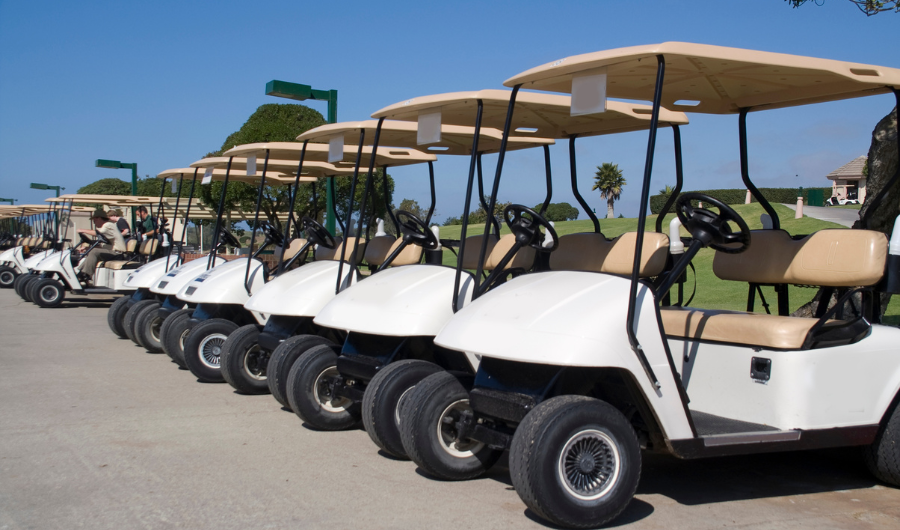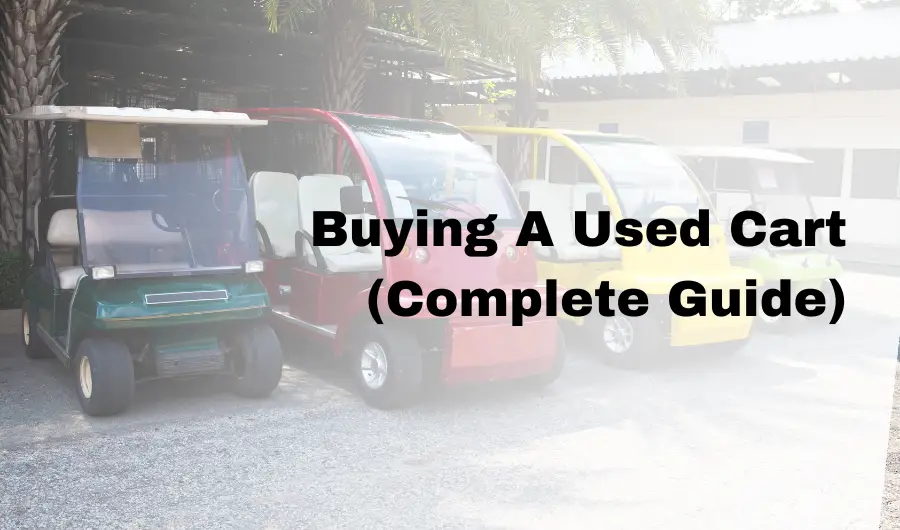When I first got into golf, the brand-new models were costing an arm and a leg. Undeterred, I started considering used golf carts as a more budget-friendly option but had no luck. The cheaper ones had no proper maintenance and were almost a wreck.
This is when I asked help from my golf-loving cousin, who was a seasoned golfer and had recently scored a great deal on a used cart. It was then that I decided to explore the world of pre-loved rides. Little did I know the challenges that lay ahead as I went through countless listings and visited numerous sellers.
If you are facing a similar dilemma, worry not! Through those trials and tribulations, I’ve gained valuable insights that I’m here to share. So, put on your golf running shoes, grab your favorite putter, and let’s tee off on the journey of finding your perfect used golf cart.
But the question arises, What to look for when buying a used golf cart?
Well, the first and foremost factor to consider is the cart’s overall condition. Look for any signs of wear and tear, paying particular attention to the tires, batteries, and body. Additionally, it’s important to check if the cart has been well-maintained and regularly serviced. This can significantly impact its performance and lifespan. If possible, take it out for a test run and pay close attention to any odd noises or maneuverability issues. The ride should be sound and seamless.
Quick Summary of my Buying Checklist

Now before getting into the world of pre-loved carts, there are a few crucial things you should inquire about. Trust me, these details can make or break your buying experience. So, if you’re ready to score a dream deal, ask the dealer about the golf cart’s history, needed replacements, actual worth, and understand the local laws.
Asking about a golf cart’s history and past life can tell a lot about it. Ask questions like: How many owners has it had? Has it been primarily used on a golf course or for personal use? Understanding its past life can give you valuable insights into how it has been treated and maintained over the years. Plus, it might even reveal any notable modifications or upgrades that could seal the deal.
Inquire the seller about any components of the golf cart that have been replaced or repaired recently. Knowing if any replacements or repairs are needed will help you assess the overall condition and potential additional costs.
Pay particular attention to the batteries if you opt for the electrical one or the miles usage and average miles per gallon in the case of Gas carts, as these factors are the most important.
Do not shy away from researching about the true value of the golf cart you have your eye on. While the seller might have a price tag in mind, it’s essential to do your homework and determine its actual worth. Research similar models and their prices in the market, considering factors such as age, condition, and features. With this knowledge, you’ll be better equipped to negotiate a fair price and avoid overpaying. (A little help here, use an online value evaluation calculator)
Before you finalize your purchase, take a moment to be acquainted with the golf cart laws in your state and make sure that the cart is legal. Different regions have varying regulations regarding golf carts’ usage, registration, and safety requirements. Knowing the rules will ensure your safety and will prevent any unexpected legal headaches down the line.
Well, hold on! There are more nuggets to share with you guys; why not break down and dip into things step by step?
With that said, let’s uncover the nitty-gritty of buying a used golf cart.
What to look for when buying a used Golf cart

If you have set your eyes on a cart and are about to make a deal, consider the following features before finalizing it. Stressing over these will help you make an informed decision and find the perfect golf cart to suit your needs.
Inquire about the age of the golf cart
First up, take a good look at the age of the cart. Just like fine wine, some carts age gracefully while others might need a bit more tender care. Hence, the age of the cart doesn’t decide whether you should buy it or not.
Older carts could require frequent maintenance and repairs; finding their parts is also a problem. Pay close attention to the model and serial number of the cart. Ask the dealer about the hours or cycles on it. So weigh the pros and cons against your budget and desire for the latest features.
Do you prefer gas-powered or electric?
Evaluate whether you are leaning towards a gas or electric cart.
Gas-powered carts pack a punch, making them ideal for courses with challenging terrains. However, they do require regular refuelling and maintenance, increasing their overall cost. On the other side, electric carts are quieter, eco-friendly, and offer lower operating costs. They run on rechargeable batteries, eliminating the need for gas and reducing emissions.
Electric carts are generally easy to maintain, requiring periodic battery charging and occasional battery replacement as they age. Consider your preferences and the specific demands of your favorite courses.
Assess the features of the cart
Think about what you truly need in a golf cart. Do you often play with friends and require ample seating capacity? Are you someone who likes to carry extra gear and accessories with you? Consider carts with storage compartments, golf bag holders, and additional seating options. Windshields and headlights can enhance your comfort and safety during early morning or evening rounds.
Some carts even come with modern conveniences like built-in GPS systems or USB charging ports. Evaluate the features that matter most to you and ensure the cart you’re eyeing has them or allows for customization.
🤚 A little tip here: Opting for more features (or I should call them unnecessary) will only amp up the price, so be picky and just go with basics – you can always add up things later.
Gauge the battery condition

When it comes to electric carts, the battery condition is a crucial aspect to assess. Inquire about the age, type, and capacity of the batteries. Lithium-ion batteries are known for their longevity and performance, while traditional lead-acid batteries are more common but may require replacement sooner.
Ask about the charging habits of the previous owner and how well the batteries hold their charge. Check if the cart has a reliable charging system and whether the batteries have been properly maintained. It’s essential to understand the expected lifespan of the batteries and any potential costs associated with replacements or upgrades.
Is it refurbished?
Renovated carts undergo a process that includes replacing worn-out components, updating physical features, and ensuring overall functionality. Professionals with expertise in golf cart renovation can transform an older model into a like-new vehicle that performs exceptionally well.
If you’re considering a renovated cart, ask for details about the renovation process, the parts that have been replaced, and any warranties or guarantees that come with it.
Examine the condition of the wheels
Examine the tires closely for signs of wear, uneven tread, or sidewall damage.

Tires are crucial in providing traction, stability, and a smooth ride on the golf course. Check if it is of 8″, 10″ or 12″.
Worn-out or improperly inflated tires can affect the cart’s performance and compromise safety. Consider the type of terrain you’ll be driving on and choose tires accordingly. If the tires show signs of significant wear or damage, factor in the cost of replacement when considering the overall value of the cart.
Take it on a test-drive:
Before you finalize the deal, take that cart for a spin. A test drive is your chance to assess its performance, acceleration, braking, and maneuverability.
Pay attention to how smoothly it starts and stops, and evaluate its ability to handle turns and varying terrain. Listen closely for any peculiar sounds or vibrations that might indicate underlying issues. Remember, a test drive provides valuable firsthand experience, helping you judge if the cart’s performance aligns with your golfing needs and preferences.
Get information about the cart
Ask the seller for details about the cart, including its make, model, serial number, and manufacturing specifics. Research the manufacturer’s reputation for reliability.
Check for any known issues associated with the specific model you’re interested in. Understanding the cart’s origin, history, and reputation will give you insights into its overall quality and reliability.
Get it professionally inspected
Thoroughly inspect the cart. Check the body for any signs of collision damage or structural issues. Look underneath the cart for leaks, loose parts, or damage to the frame or suspension components.
It’s also essential to inspect the electrical system, including the lights, solenoid, switches, controller, and wiring, to ensure everything is in proper working order. If you’re unsure about assessing the cart’s condition yourself, it’s wise to call in a professional for an inspection. A certified technician can thoroughly examine the cart, identify any hidden bugs, and provide you with a comprehensive report.
Does it value your money?

Compare the price of the cart with similar models on the market. Consider its age, condition, included features, and any recent repairs or upgrades. Research the current market value of comparable carts to gauge whether the asking price is reasonable.
Keep in mind that there may be room for negotiation, especially if the cart requires repairs or if there are comparable options available at a lower price. Consider the long-term value as well, factoring in potential maintenance costs, future upgrades, and resale value.
Don’t’s when buying a used Golf Cart
Now, let’s talk about the don’ts when it comes to buying a used golf cart. You should avoid these pitfalls to ensure a smooth and satisfying purchasing experience. So, pay attention and take notes!
Don’t neglect the licensing requirements
First and foremost, don’t forget to check the licensing necessities in your area. Different regions have specific requirements for golf cart usage, including licensing, registration, and insurance. Ensure that you understand the local laws and regulations governing golf carts before making a purchase. You don’t want to end up with a cart that can’t legally be driven on the courses or roads in your area. Add a street legal kit if required.
Don’t buy a knockoff cart
Another important “don’t” is buying a replica or off-brand golf cart. Stick to reputable and well-established brands that have a track record of producing high-quality carts (check out my other detailed guide on reputable Electric Carts Brands right now in the market).
While replica carts might come with a tempting price tag, they often lack the reliability and durability that established brands provide. Opting for a trusted brand ensures better access to replacement parts, servicing options, and a reliable network of authorized dealers. It’s a decision that will save you headaches and frustration in the long run.
Don’t shy away from negotiating
Don’t be afraid to negotiate! Many sellers are open to price discussions, especially regarding used golf carts. Do your research, know the market value of comparable carts, and use that information as leverage during the negotiation process.
Consider the condition of the cart, any necessary repairs or replacements, and the presence of additional features when determining a fair price. Negotiating can potentially save you some hard-earned cash or lead to additional perks, so don’t shy away from it.
Don’t settle for less

If you are not sure about the best golf carts, do not settle. Take your time, do your due diligence, and explore multiple options before making a final decision. Rushing into a purchase without proper evaluation can lead to regrets later on.
Consider your specific needs, budget, and preferences, and make sure the cart you choose aligns with them. Patience pays off when finding the perfect cart that meets your requirements.
Don’t let the additional features distract you
Features matter, but it’s important to prioritize what truly matters.
It’s easy to get swayed by fancy gadgets or luxurious add-ons, but ask yourself if they are truly essential for your needs. Focus on the features that directly impact your comfort, safety, and performance on the golf course. Don’t let yourself be overwhelmed by a long list of extras that you might not actually need or use. Keep your requirements in mind and choose a cart that strikes the right balance between practicality and desired features.
Wrapping It Up

Considering these comprehensive factors when buying a used golf cart, you’ll be well-prepared to find the perfect set of wheels to elevate your golfing experience. As long as you do your research, ask those important questions, examine the cart’s condition with a discerning eye, and master the art of negotiation, you’ll be well on your way to finding that perfect used golf cart.
Be cautious about checking licensing requirements, avoiding off-brand carts, and not settling for the wrong cart. Prioritize your needs, and don’t get too caught up in unnecessary features. Trust me, the effort will be worth it when you cruise the fairways in your very own cart.
A guy with a charming face following his passion (both Golf and Blog) from Kansas. Bryan is the writer and creator of IAmLearningHowToGolf.com, loves golf, but he didn’t start playing until he was in his 20s. He’s not a pro by any means, but he’s put in the time and effort to get pretty darn good. Bryan’s main goal with this blog is to help other golfers improve their game and have more fun on the course. He does this by writing informative, relatable, and down-to-earth content. When he’s not golfing or writing, Bryan enjoys going on hikes, spending time with his family, and watching movies sometimes. For any queries reach out to him at Bryan@iamlearninghowtogolf.com.

